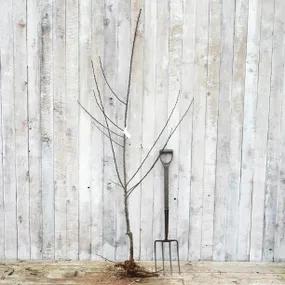Old Greengage Trees

The details
- Eating.
- Self Sterile
- Crops in August
Recommended extras
Description
Prunus Old Greengage
Description of Old Greengage Trees & Fruit:
Old Greengage isn't a heavy cropper in most parts of Britain, but it is probably one of the best eating plums around (gages are really just a type of plum). If you are looking to add a real delicacy to your fruit collection, we think that this tree is a must have. Think quality rather than quantity. And crop size will improve if you have a reliable pollinator such as Oullins Golden Gage around. The Cambridge Gage tree is very similar to the Old Greengage, but it is a more reliable cropper.
Browse our range of plums & gages or all of our fruit trees.
Characteristics of Old Greengage Trees:
- Self sterile.
- Crops in August.
- Pollination group D
Growing Old Greengage Plum Trees:
We recommend this tree for gardens South of Liverpool. It will grow happily further North, but the crops may be small unless it is in a warm spot or the summer is good.
Rich soil is important - dig in plenty of good manure and compost before planting. Use Rootgrow and ensure that the planting site is well drained. as with most plums, the more sun your trees get the better your crops will be.
Pests: A Greengage tree is a magnet for birds and wasps. It's easy to keep the birds off, you just need to net the trees. The worst wasp attacks can be avoided by picking the fruit as soon as they are ripe, but if you need full protection the best thing to do is to use old pairs of nylon tights or stockings to gently cover the bunches of gages. It usually helps if you give them a good stretching first.... Use soft garden string to close the ends of the tights around the branch and your crop will be safe.
Pollination Partners for Old Greengage:
Your trees must be pollinated to make fruit. Your trees are in pollination group D, which means that they will cross pollinate with trees in groups C, D and E of our plum tree pollination table.
Details about delivery sizes: Guide to Fruit Tree Sizing.
History & Parentage of Old Greengage:
Greengages are a sub-group of plums. The trees were spread from Armenia in medieval times and were brought to France in the early 1500's. The first record of them in Britain is from 1629, when they were brought from Italy and known as Verdocchia. Sir William Gage imported more of them sometime around the 1720's and they came to named after him. The Old Greengage was chosen by the RHS as the best of all the various similar gage trees that date from this period.
Please note that all our Old Greengage trees are on St Julien A rootstocks unless otherwise described.

 1.webp)
 1.webp)
 2.webp)
 3.webp)
